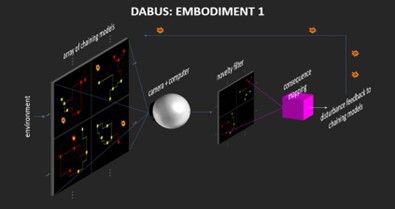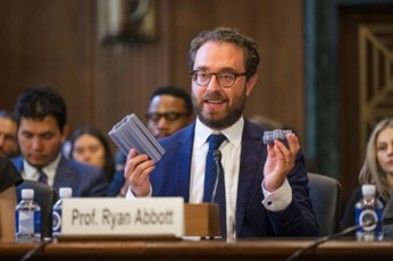In recent legal debates, the patentability of AI-generated inventions has been contentious. Historically, only humans have been considered inventors, anchored in notions of personhood and intellect. Yet, in a bold move, South Africa and Australia's Federal Court recognized AI, specifically DABUS, as a potential inventor in 2021, defying conventional views. Proponents argue that this accommodates modern innovation trends, while sceptics raise concerns about ownership rights, the potential inundation with trivial patents, and diminished human oversight. With patent laws varying globally, the landscape remains dynamic. As AI's role in R&D grows, more countries are likely to re-evaluate their stances, reshaping the intellectual property (IP) sphere.
Are you surprised by the depth and clarity of that introduction? Here's the twist: an AI tool created that paragraph. Today's AI technology has effortlessly started to undertake roles traditionally held by humans, and yes, that is highly likely to include inventions.
The debate on whether or not an artificial intelligence system can be an inventor began after the development of DABUS, the artificial intelligence system developed by Dr. Stephen Thaler. A team led by Dr. Thales and Prof. Ryan Abbott started filing applications with patent offices worldwide for two separate inventions of DABUS and launched the "Artificial Inventor Project". This project aims to set a precedent on whether artificial intelligence can be considered an inventor1. It also seeks to encourage dialog about the social, economic, and legal implications of pioneering technologies, such as artificial intelligence, and to guide stakeholders on the protectability of outputs/products produced by artificial intelligence.

To assess these developments and approaches, one must examine the outcomes of the DABUS team's applications to various patent offices worldwide within the scope of this project:

USA, the UK and the European Patent Office (EPO):
In July 2019, Thaler submitted patent applications for two DABUS inventions to the United States Patent and Trademark Office (USPTO), listing DABUS as the sole inventor. However, these applications were rejected on the grounds that the applications were incomplete due to the absence of a real human inventor. Following Thaler's request for review of the decisions, the Federal District Court concluded that an "inventor" under the Patent Act must be an "individual", and the meaning of "individual" is a natural person. The Supreme Court also emphasized that inventorship is a concept that requires a mental act and thus, an AI cannot be the inventor. With Thaler's appeal in 2022, the case became the first in which the Federal Court would explicitly address whether AI could be considered an inventor under the Patent Act. Consequently, the Supreme Court has held that "individual" refers to human beings, and therefore "inventors" must be human beings.2
The United Kingdom Intellectual Property Office (UKIPO) rejected Thaler's DABUS applications on the grounds that DABUS is not a "person", and thus cannot be considered an inventor.3 The UK High Court and the Court of Appeal upheld this decision of the UKIPO.4 Although Thaler subsequently appealed to the UK Supreme Court, a decision for the appeal is still pending.5 If the UK Supreme Court rules in favor of Thaler, it will be the world's first supreme-level court to deliberate on this issue.6
Similarly, Thaler filed two European patent applications with the European Patent Office (EPO) in 2018, both of which were rejected upon EPO's determination that the inventor designated in a European patent must be a "natural person".7 The Legal Board of Appeal, in its preliminary opinion, stated that under the European Patent Convention, the inventor designated in a patent application must be a person with legal capacity. In December 2021, the Legal Board of Appeal dismissed Thaler's appeal. Thaler's latest divisional application, where he is named as the inventor, remains pending before the EPO.8
Australia
The Australian Federal Court rendered a promising decision on the inventorship of AI, which proved to be relatively short-lived. In September 2019, after Thaler's patent application, which designated DABUS as the inventor, was rejected by the Australian Patent Office, the decision was appealed. The Federal Court hearing the case made a significant statement: "an inventor as recognized under the Act can be an artificial intelligence system or device. But such a non-human inventor can neither be an applicant for a patent nor a grantee of a patent". This decision marked the first court decision to allow an artificial intelligence machine to be designated as the inventor.9
However, upon request of an appeal by the Australian Patent Office, the Federal Court accepted the appeal in April 2022 and overturned its previous decision. The court found that "The origin of entitlement to the grant of a patent lies in human endeavor, and designating DABUS as the inventor is contrary to the Patent Act".10 In November 2022, Thaler's request of an appeal was refused by the High Court.
Germany
The German Federal Patent Court took a different perspective on the issue of AI inventorship regarding DABUS applications. An appeal was filed before the Federal Patent Court upon the rejection of Thaler's application by the German Patent Office, where the court acknowledged that AI inventions are patentable but stipulated that the inventor must be presented as a natural person in the application. This decision is significant as it made it possible to include AI's involvement in a patent application, sidestepping the debate over who could be deemed the inventor. The court set out that the one responsible for the invention must be identified as the inventor on the relevant paperwork, and details regarding the contribution of an AI system may be added as additional information.11
South Africa
In South Africa, a unique situation unfolded when the Companies and Intellectual Property Commission (CIPC) accepted Dr. Thaler's application for a patent related to inventions generated by DABUS. In July 2021, the CIPC issued a patent issuance notice, thereby granting the world's first patent for an AI invention without a human inventor. With this decision, the AI itself was designated as the inventor, and the owner of the AI was recognized as the holder of the patent in DABUS applications.12 However, it should be noted that South Africa registers applications upon their decisions without conducting substantive examinations.13
General overview and assessment of Turkey's position
Turkish patent law foresees that the "actual ownership of the right" principle dictates that the individual who creates or develops intellectual property is recognized as the rightful owner.Article 109/1 of the Industrial Property Law (IPL) states that "the right to obtain a patent belongs to the inventor or his legal successors, and it is possible to assign this right to others".
As known, for an invention to be patented, it must be novel, involve an inventive step, and be applicable to industry. Therefore, these aspects will also be considered in the patentability assessment of an invention developed by AI. The legal nature of the inventor is not listed among the patentability criteria, as the lawmaker did not even consider the possibility of AI being an inventor when drafting the provisions.
While there is no specific regulation addressing the inventorship of artificial intelligence in Turkish Law, it is vital to note that there have been no legal precedents in Turkey similar to the cases such as that of DABUS, nor have there been any applications to the Turkish Patent and Trademark Office designating AI as the inventor. Consequently, the matter remains open to debate and contemplation of differing perspectives.
This being said Turkey's approach is expected to be similar to that of the EPO. Indeed, if the DABUS applications filed before the EPO (which also encompasses Turkey) had been registered by the EPO instead of being rejected, the patents in question would now registered before the Turkish Patent and Trademark Office in accordance with the European Patent Convention.
The basis of the problems discussed in Turkey (as well as in many other countries) regarding the inventorship of artificial intelligence lies in the determination of the legal status of the AI and the introduction of special legal regulations and gaining precedence on this issue.14 Thus, designating AI as the inventor in patent applications will pave the way for artificial intelligence to be recognized as the patent owner. In such a case, this will mark the beginning of a new era in patent law, especially in liability law.
In regard to Turkish laws, the Turkish Civil Code (the Code) regulates both natural and legal persons. According to the Code, every individual has the capacity to exercise rights, and all persons are equal in terms of their rights and obligations within the legal system. The Code also regulates the capacity to act, and, accordingly, a person who has the capacity to act can acquire rights and incur debts through their actions. On the other hand, legal entities are subject to all rights and obligations other than those that are inherently related to human beings, such as sex, age, and kinship. Legal entities acquire the capacity to act by having the necessary organs. As for artificial intelligence, it is under debate as to which of these two personality types it falls under or whether it should be considered as a separate type.
Although there is no regulation on artificial intelligence in Turkey as yet, Turkish doctrine considers it possible for artificial intelligence to be considered as a legal person or an "enslaved person" as in Roman law and to be regulated within this scope. Some Turkish scholars argue that AI should be considered a legal person. However, not a natural person but a legal entity such as an association since its relationship is similar to that between an association and its board members.15
However, according to another perspective, Roman law may offer a solution to AI's legal personality challenge. This idea suggests that the status of enslaved people in Roman law can be considered and applied as an example of the status of AI in terms of holding economic and IP rights. In Roman law, under the peculium system, enslaved persons were able to have limited, yet legal, relations with third parties even though they were considered the "property" of another person.
Similarly to the system of enslavement, there are debates as to whether AI may be able to hold IP rights and, only within a limited scope, be held responsible for the legal consequences of its actions. If this is the case, AI could be designated as an inventor for a certain invention without meaning that AI is a real person or that it holds the rights of an actual person. In this way, the issue of who will own the rights of AI and the matter of responsibility could be solved, at least for the time being.16
Footnotes
1. Ryan Abbott, "The Artificial Inventor Project", www.wipo.int, December 2019, https://www.wipo.int/wipo_magazine/en/2019/06/article_0002.html.
2. Thaler v. Vidal (US Court of Appeals for the Federal Circuit, 5 August 2022).
3. BL O/741/19 (UKIPO 4 December 2019).
4. Thaler v. Comptroller (EWCA Civ 1374, 21 September 2021).
5. "The Supreme Court Hearing: Thaler v. Comptroller," 2 March 2023, https://www.supremecourt.uk/watch/uksc-2021-0201/020323-am.html.
6. Mark Marfé & Sarah Taylor, "Landmark Thaler AI Patent Case to Be Heard by UK Supreme Court", Pinsent Masons, 1 March 2023, https://www.pinsentmasons.com/out-law/news/landmark-thaler-ai-patent-case-heard-uk-supreme-court.
7. "EPO Publishes Grounds for Its Decision to Refuse Two Patent Applications Naming a Machine as Inventor", EPO, 28 January 2020, https://www.epo.org/en/news-events/news/epo-publishes-grounds-its-decision-refuse-two-patent-applications-naming-machine.
8. Kingsley Egbuonu, "The Latest News on the DABUS Patent Case", IP STARS, 11 July 2023, https://www.ipstars.com/NewsAndAnalysis/The-latest-news-on-the-DABUS-patent-case/Index/7366.
9. Thaler v. Commissioner of Patents (FCA 879, 30 July 2021)
10. Commissioner of Patents v Thaler (FCAFC 62, 13 April 2022)
11. Christina Schulze, "German Federal Patent Court Points to Solution for Dabus Inventions", JUVE Patent, 16 November 2021, https://www.juve-patent.com/cases/german-federal-patent-court-points-to-solution-for-dabus-inventions/
12. Ryan Abbott, "First Patent Granted to the Artificial Inventor Project", Artificial Inventor, 28 July 2021, https://artificialinventor.com/first-patent-granted-to-the-artificial-inventor-project/
13. Desmond Oriakhogba, "Dabus Gains Territory in South Africa and Australia: Revisiting the AI-Inventorship Question", South African Journal of Intellectual Property Law, 1 October 2021, https://doi.org/10.2139/ssrn.3998162
14. Dr. Armağan Ebru Bozkurt Yüksel, "Yapay Zekânın Buluşlarının Patentlenmesi", Uyuşmazlık Mahkemesi Dergisi, June 2018, https://doi.org/10.18771/mdergi.437298
15. Başak Bak, "Medeni Hukuk Açısından Yapay Zekânın Hukuki Statüsü ve Yapay Zekâ Kullanımından Doğan Hukuki Sorumluluk", Türkiye Adalet Akademisi Dergisi, No. 35, 1 July 2018.
16. Emine MINDIZ, "Peculium Kurumunun Yapay Zekâya Sahip Robotların Hukukî Statülerinin Tespitinde Model Olarak Kullanılması", Ankara Üniversitesi Hukuk Fakültesi Dergisi 71, No. 3, 20 October 2022, https://doi.org/10.33629/auhfd.1133837
The content of this article is intended to provide a general guide to the subject matter. Specialist advice should be sought about your specific circumstances.


